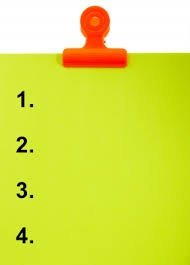The ability to focus may be one of the most important techniques to master to achieve great things in life. But if you’re trying to split your focus to include more than one task, then you’re definitely hurting your productivity.
You only get to find out that the task you splits your focus into doing contains lots of errors. This can make you “Jack of all trade, master of none”
If you want to get more done in less time, you need to stop multitasking. Instead of doing many things at half-effort, concentrate on your most important tasks… one at a time. is key.
[lwptoc]
Here are 20 Most Effective Ways To Overcome Multitasking Problems And Focus More
1. Write down your tasks

You might want to do every item as it arrives on your agenda, but that is not an efficient way to handle your duties. When new ideas pop up, briefly write down a note or put it on your calendar for future reference.
Go back to your original task. Writing it down allows your brain to set it aside and refocus.
2. Don’t Skip
Are you tired of your task? Take five minutes and breathe; but never give up on that task.
One of the best ways to avoid multitasking is to complete the task and not give up. If you give up on task, the previous one –unfinished one– will always be in your mind when you do the next task. So in this case, complete your tasks and never give up.
3. Clean Up Your Desk Area
If you are finding it difficult to concentrate, think of your desk as prime real estate. Whatever sits on it needs to deserve to take up the space. Only items you use on a daily basis should sit here.
Keep supplies close by like drawers and pencil caddies are convenient ways to make sure often-used items are handy.
Also, keep things in reach such as resources, files and other items you use on a daily basis should be within arms reach. If you keep a telephone book on your desk, but use an online directory, then the phone book needs to go.
4. Set Up A routine
This can be helpful if you spend a good chunk of your day on the computer or working from home. Instead of diving in to tasks willy-nilly, set up a schedule that tells you what to work on and when (and be sure to incorporate some breaks into the day).
That way, you’ll know what to expect from yourself each time you sit down to work (and you’ll be less tempted to goof off on whateverwebsite.com ).
5. Schedule how you check your email
It’s not effective to read and answer every email as it arrives. Just because someone can contact you immediately does not mean that you have to respond to them immediately. People want a predictable response, not an immediate response.
So as long as people know how long to expect an answer to take, and they know how to reach you in an emergency, you can answer most types of email just a few times a day.
6. Set goals
7. Break your Deadlines
We all know how quickly we can work when something is due tomorrow. If we give ourselves a week, it will take a week. Tell me it’s due tomorrow and see how my mind focuses on getting it done.
Schedule time in your calendar and tell yourself it must be done in a shorter time frame. Make sure you eliminate all possibilities of distraction.
[tweetshare tweet=”Deadlines are meant to be broken. And I just keep breaking them. —Sarah McLachlan” username=”itzandyjones”]
8. Avoid any Tech. Distractions

Technology has allowed us to work anywhere. That doesn’t mean you should. Close your email, turn off the phone, and put down the unneeded tech while you are working.
9. Meditate
10. Eliminate Outside Distractions
Instead of letting pop-ups of emails and text messages grab your attention, turn off your notifications so you can concentrate effectively. “To successfully uni-task, you need to do the same type of thing; eliminate any outside distractions,
11. Say no early and often
Attempting to be all things to all people is more than unrealistic. It’s a recipe for disaster. It’s perfectly fine, even responsible, not to respond to every request immediately. “No, I can’t right now” is not equivalent to “No, I won’t ever do it.” By saying no, you’ll be free from the constant frustration of half-finished tasks.
12. Work on your most important tasks first
I think one of the reasons that we give in to multi-tasking is that we feel more and more anxious as the day goes on that we have not accomplished what we wanted to, or what was important to us.
Identify at the start of each day (or better yet, at the end of the day before) one or two really important things that you want to accomplish during that day. Then do those tasks first. The sense of relief and accomplishment is immense, and you will find that you are more relaxed as the day goes on.
13. Follow The Two-Minute Rule
Recommended by entrepreneur Steve Olenski, this rule states that if you have a small window of opportunity of two minutes or less to complete a very simple task, then you should do it immediately. Rather than having it earmarked for a later date, doing it immediately will take much less time and you can become more productive.
14. Commit to your choices
Single tasking obliges you to do one thing at a time—excluding any other demands at that moment. This means you must stand firm and genuinely commit to your choices.
You can manage your next task after working on the existing one. You don’t have to complete every task all at once, just the current period of time dedicated to it.
[tweetshare tweet=”Productivity is never an accident. It is always the result of a commitment to excellence, intelligent planning, and focused effort. — Paul J. Meyer” username=”itzandyjones”]
15. Build fences

At work, it’s up to you to control your environment—to “build fences” to keep potential distractions, such as noise and pop-ups, at bay. Rather than blame technology (think your computer and smart-phone) or nearby colleagues, take control of your workspace and gadgets.
For example, before a conference call, close your door or put a “Quiet” Post-it note outside your cubicle. Mute all chimes, ringers, and pings, and turn off visual alerts and social media messaging.
16. Don’t wait for inspiration/procrastinate – do it now.
Some artists wait for inspiration to strike. Some writers sit around, waiting for writer’s block to subside. Business people don’t attend to serious tasks if they aren’t in a perfect work environment.
With mindfulness, you don’t have to feel like getting something done to do it. Notice the thoughts and feelings that arise while you work from an outside perspective. Don’t let them govern your actions.
Acknowledge your emotions and daydreams and let them go. Start tasks, even when you feel unsure, and trust your motivation to follow.
17. Give yourself a break
19. Add a “done list” to your to-do list.
Sometimes, unexpected tasks just pop up during the day. Jot them down in a separate list next to your to-dos for some extra satisfaction at the end of the day.
On Sunday, revisit your accomplishments from the previous week and congratulate yourself on your successes. This review period will increase your confidence and help you create the next week’s schedule.
20. Final Thought Say “I can do it” to Yourself
You can do. Believe in yourself. Believe in yourself every minute, every second.
Think this task is a vital. No matter how boring it is, complete this task. Trust yourself.
Everything starts with your confidence, remember!
[tweetshare tweet=”You can do what you have to do, and sometimes you can do it even better than you think you can. — Jimmy Carter” username=”itzandyjones”]






